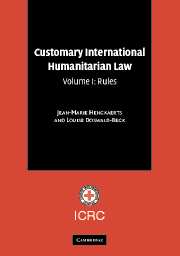Book contents
- Frontmatter
- Contents
- Foreword by ICRC President Jakob Kellenberger
- Foreword by Judge Abdul G. Koroma
- Foreword by Yves Sandoz
- Acknowledgements
- Introduction
- List of abbreviations
- Part I The Principle of Distinction
- Part II Specifically Protected Persons and Objects
- Part III Specific Methods of Warfare
- Part IV Weapons
- Chapter 20 General Principles on the Use of Weapons (Rules 70–71)
- Chapter 21 Poison (Rule 72)
- Chapter 22 Nuclear Weapons
- Chapter 23 Biological Weapons (Rule 73)
- Chapter 24 Chemical Weapons (Rules 74–76)
- Chapter 25 Expanding Bullets (Rule 77)
- Chapter 26 Exploding Bullets (Rule 78)
- Chapter 27 Weapons Primarily Injuring by Non-detectable Fragments (Rule 79)
- Chapter 28 Booby-traps (Rule 80)
- Chapter 29 Landmines (Rules 81–83)
- Chapter 30 Incendiary Weapons (Rules 84–85)
- Chapter 31 Blinding Laser Weapons (Rule 86)
- Part V Treatment of Civilians and Persons Hors De Combat
- Part VI Implementation
Chapter 22 - Nuclear Weapons
Published online by Cambridge University Press: 05 June 2012
- Frontmatter
- Contents
- Foreword by ICRC President Jakob Kellenberger
- Foreword by Judge Abdul G. Koroma
- Foreword by Yves Sandoz
- Acknowledgements
- Introduction
- List of abbreviations
- Part I The Principle of Distinction
- Part II Specifically Protected Persons and Objects
- Part III Specific Methods of Warfare
- Part IV Weapons
- Chapter 20 General Principles on the Use of Weapons (Rules 70–71)
- Chapter 21 Poison (Rule 72)
- Chapter 22 Nuclear Weapons
- Chapter 23 Biological Weapons (Rule 73)
- Chapter 24 Chemical Weapons (Rules 74–76)
- Chapter 25 Expanding Bullets (Rule 77)
- Chapter 26 Exploding Bullets (Rule 78)
- Chapter 27 Weapons Primarily Injuring by Non-detectable Fragments (Rule 79)
- Chapter 28 Booby-traps (Rule 80)
- Chapter 29 Landmines (Rules 81–83)
- Chapter 30 Incendiary Weapons (Rules 84–85)
- Chapter 31 Blinding Laser Weapons (Rule 86)
- Part V Treatment of Civilians and Persons Hors De Combat
- Part VI Implementation
Summary
The present study was mandated by the 26th International Conference of the Red Cross and Red Crescent in December 1995. A year earlier, the UN General Assembly had asked the International Court of Justice for an advisory opinion on the following question: “Is the threat or use of nuclear weapons in any circumstance permitted under international law?” All States wishing to do so had the opportunity to express their opinion on this question, in written statements and the oral pleadings before the Court. In an advisory opinion of 8 July 1996, the International Court of Justice stated in relation to customary international law and the applicability of international humanitarian law to nuclear weapons that:
There is in neither customary nor conventional international law any specific authorization of the threat or use of nuclear weapons;
There is in neither customary nor conventional international law any comprehensive and universal prohibition of the threat or use of nuclear weapons as such;
A threat or use of nuclear weapons should also be compatible with the requirements of the international law applicable in armed conflict, particularly those of the principles and rules of international humanitarian law, as well as with specific obligations under treaties and other undertakings which expressly deal with nuclear weapons;
It follows from the above-mentioned requirements that the threat or use of nuclear weapons would generally be contrary to the rules of international law applicable in armed conflict, and in particular the principles and rules of humanitarian law; […]
- Type
- Chapter
- Information
- Customary International Humanitarian Law , pp. 255Publisher: Cambridge University PressPrint publication year: 2005



